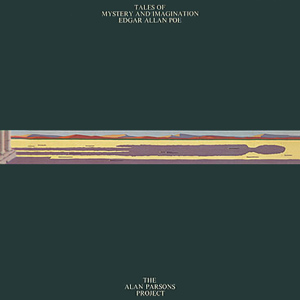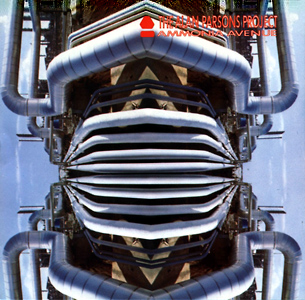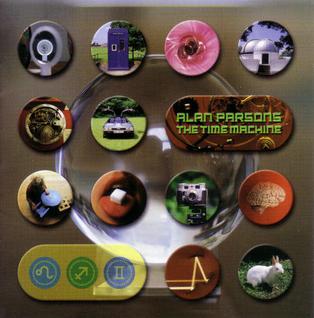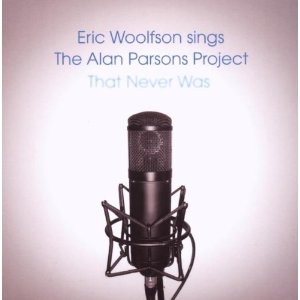Related Research Articles

The Alan Parsons Project were a British rock band formed in London in 1975. Its core membership consisted of producer, audio engineer, musician and composer Alan Parsons, and singer, songwriter and pianist Eric Woolfson. They shared writing credits on almost all of their songs, with Parsons producing or co-producing all of the recordings, while being accompanied by various session musicians, some relatively consistent.

Tales of Mystery and Imagination (Edgar Allan Poe) is the debut studio album by British rock band the Alan Parsons Project. It was released on 25 June 1976 in the United Kingdom and Ireland by Charisma Records and 20th Century Records in the rest of the world. The lyrical and musical themes of the album, which are retellings of horror stories and poetry by Edgar Allan Poe, attracted a cult audience. The title of the album is taken from the title of a collection of Poe's macabre stories of the same name.

Ammonia Avenue is the seventh studio album by the British progressive rock band the Alan Parsons Project, released in February 1984 by Arista Records. The Phil Spector-influenced "Don't Answer Me" was the album's lead single, and reached the Top 15 on the US Billboard Hot 100 and Mainstream Rock Tracks charts, as well as the fourth position on the Adult Contemporary chart. The single also reached the Top 20 in several countries and represents the last big hit for the Alan Parsons Project. "Prime Time" was a follow-up release that fared well in the Top 40, reaching No. 34. "You Don't Believe" was the first single in November 1983, reaching #54 on the Billboard Hot 100 and "Since the Last Goodbye" was a minor hit.

I Robot is the second studio album by British rock band the Alan Parsons Project, released on 8 July 1977 by Arista Records. The album draws conceptually on author Isaac Asimov's science fiction Robot stories, exploring philosophical themes regarding artificial intelligence.

Pyramid is the third album by progressive rock band The Alan Parsons Project, released in May 1978. It is a concept album centred on the pyramids of Giza. At the time the album was conceived, interest in pyramid power and Tutankhamun was widespread in the US and the UK. Pyramid was nominated for the 1978 Grammy Award for Best Engineered Album, Non-Classical.

On Air is the second solo studio album by English rock musician Alan Parsons. The album's chief creative force was the Alan Parsons Project's long-time guitarist, Ian Bairnson. Its concept revolves around the history of airborne exploration.

The Time Machine is the third solo album by English rock musician Alan Parsons.

Pilot are a Scottish rock group, formed in 1973 in Edinburgh by David Paton and Billy Lyall. They achieved considerable mainstream success during 1974–1975, primarily with the release of "Magic" which reached number one in Canada, five on the U.S. Billboard Hot 100, six in Ireland and eleven in the United Kingdom. Follow up single "January" released in 1975 reached number one in Australia, Ireland and the United Kingdom, as well as reaching eighty-seven in the United States. In the United Kingdom, "January" was awarded a Silver certification from the BPI.

John "Ian" Bairnson was a Scottish musician and member of Pilot and the Alan Parsons Project. He was a multi-instrumentalist, who played saxophone and keyboards, but mainly performed as a guitarist, which he played with a sixpence. In addition to his work with Parsons, Bairnson played guitar on four Kate Bush albums, including the guitar solo on her 1978 debut single, "Wuthering Heights".

David Paton is a Scottish bassist, guitarist and singer. He first achieved success in the mid-1970s as lead vocalist and bassist of Pilot, who scored hits with "Magic", "January", "Just a Smile" and "Call Me Round" before splitting in 1977. Paton is also known for his work in the original lineup of The Alan Parsons Project (1975-1985), and for working with acts such as Kate Bush, Camel and Elton John.

Alan Parsons is an English audio engineer, songwriter, musician and record producer.

Christopher James Harley, known by the stage name Chris Rainbow, was a Scottish pop rock singer and musician whose songs "Give Me What I Cry For" and "Solid State Brain" were often played by British radio DJs Kenny Everett and Tony Blackburn in the 1970s.
"(The System of) Dr. Tarr and Professor Fether" is a 1976 single by the Alan Parsons Project. It first appeared on their debut album, Tales of Mystery and Imagination: Edgar Allan Poe. The single reached number 37 on the US Billboard Hot 100 and number 62 in Canada.
"The Raven" is the first song by the Alan Parsons Project, recorded in April 1976 at Mama Jo's Studio, North Hollywood, Los Angeles. It is the second track on their debut album, Tales of Mystery and Imagination, which is a tribute to author and poet Edgar Allan Poe. Though the song is based on Poe's poem of the same name, and is almost a verbatim recital of the lyrics of the poem, Poe is not given song writing credit. It is credited to Alan Parsons and Eric Woolfson.

The Essential Alan Parsons Project is a compilation album released by English progressive rock musician Alan Parsons and the Alan Parsons Project on 6 February 2007. It was released through Sony BMG as part of The Essential album series. The album featured some of the band's best known songs as well as some rare tracks.
Stuart Alexander Elliott is an English drummer, composer and producer. He was the original drummer for Steve Harley and Cockney Rebel and during his time with this band he became a session drummer playing for top artists such as Kate Bush, Al Stewart, The Alan Parsons Project, Roger Daltrey, Paul McCartney, Claudio Baglioni, Lucio Battisti, among others.

Eric Woolfson sings The Alan Parsons Project That Never Was is an album by the progressive rock musician Eric Woolfson, co-creator with Alan Parsons of The Alan Parsons Project, as well as main songwriter and manager of the band. Released in 2009, this was Woolfson's final album before he died of cancer in December of that year. The album includes songs that remained unreleased since the Project time for various reasons; however, as Woolfson himself remarks in the booklet, Parsons' dislike for some of Woolfson's compositions would have often caused them to be excluded from a Project album in its very early stages - such as, for example, "Steal Your Heart Away", an "unashamedly commercial" song with a conventionally sentimental lyric, which Parsons, in Woolfson's words, would have absolutely detested. "Somewhere in the Audience" and "Immortal" are slightly re-arranged and re-recorded versions of two of Woolfson's demos for his 2003 musical about Edgar Allan Poe; the final versions of these songs, sung by the musical's protagonist Steve Balsamo, are featured on the album Poe: More Tales of Mystery and Imagination. "Train to Wuxi" was the original version of "Train to Freedom", which is also included in the Poe musical and features Woolfson's one and only guitar solo.

"Old and Wise" is a ballad by the Alan Parsons Project from the album Eye in the Sky, released in December 1982. The song reached number 74 in the United Kingdom, the first of the band's singles to chart in that country.

"Tumbling Down" is a song by the British rock band Cockney Rebel, fronted by Steve Harley. It was released in 1975 as the third and final single from the band's second studio album The Psychomodo (1974). The song was written by Harley, and produced by Harley and Alan Parsons.

Alan Parsons Live is the first live album by Alan Parsons, recorded in May 1994 during his European tour, and released late that year by Arcade Records in Europe. RCA/BMG added three new studio tracks and changed the cover art when releasing the album in the rest of the world in 1995, renaming it The Very Best Live; stylized on the cover with "The Very Best" in a smaller font between Alan Parsons and Live. Despite the tour promoting Try Anything Once with seven songs from the album in the setlist, the live performances on the album are all songs from his years with The Alan Parsons Project.
References
- ↑ History of The Alan Parsons Project Archived 16 June 2008 at the Wayback Machine
- ↑ John Miles, Laurence Cottle, Ian Bairnson, Contributed to The Alan Parsons Project Archived 31 October 2007 at the Wayback Machine
- ↑ "Ian Bairnson Official Site Discography Back". Ianbairnson.com. Retrieved 19 December 2017.
- ↑ "Ian Bairnson Official Site Discography - Jack Harris - Sail Away". Ianbairnson.com. Retrieved 19 December 2017.